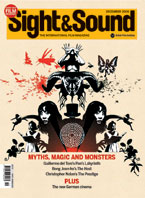Primary navigation

UK 2006

Reviewed by Michael Brooke
Our synopses give away the plot in full, including surprise twists.
London, the present, 3.07am. Twenty-five-year-old prostitute Kelly and 11-year old runaway Joanne hide in a public lavatory following an evidently violent and terrifying encounter. Kelly decides to go to Brighton to hide out with her friend Karen, and offers to take Joanne with her. She raises the train fare by servicing a passing kerb-crawler. At daybreak, Kelly's pimp, Derek, is ordered to see gangster Stuart. The latter's father, Duncan, has been found murdered, and Derek is the only lead. Derek's leg is slashed open as a hint of what will happen if he fails to find Kelly and Joanne. Derek had previously asked Kelly to procure a very young girl for Duncan, and Joanne had been spotted begging outside Waterloo Station. In Brighton, the girls find Karen's house, and Kelly leaves her mobile phone there when going out to raise more money. When Derek rings, Karen's housemate betrays Joanne and Kelly's whereabouts. Derek and his sidekick, Chum, drive to Brighton, and take Kelly and Joanne hostage. As night falls, Stuart arrives with his henchman, and orders Derek and Chum to drive to a deserted field with the girls in the boot. While Derek and Chum dig a grave, Stuart interrogates Joanne in his car. She tearfully confesses that she stabbed Duncan with the knife that he threatened her with after tying her to his bed. Disgusted, Stuart has Derek and Chum shot dead. Kelly accompanies Joanne to the home of the girl's grandmother in Devon, and watches them embrace - but from a distance.
For anyone with too vivid memories of turn-of-the-millennium British cinema, when assorted Tarantino and Guy Ritchie wannabes vied with each other to plumb new depths of cack-handed unwatchability, London to Brighton's synopsis, populated by prostitutes, pimps, and dynastic gangsters, makes dispiriting reading. But while Paul Andrew Williams' first feature isn't exactly a pleasant surprise (its relentless unpleasantness being crucial to maintaining its palm-sweating immediacy), it's a startlingly accomplished piece of work.
The director belies his inexperience by maintaining a pile-driver momentum, opening the film just after the murder of Duncan, a paedophile gangland kingpin. When Duncan's son, Stuart, sets a deadline by which low-rent pimp Derek must find the only suspects (prostitute Kelly and pre-teenage runaway Joanne, who have fled to Brighton) the film's propulsive urgency barely lets up.
This, plus a quintet of superb central performances, papers over some glaring implausibilities: surely you'd call the police if you were evicted from your home by shotgun-wielding strangers?
Shooting in jittery, handheld Scope, Williams eschews the format's panoramic possibilities in favour of extreme close-ups that convey the effect of peering through a letterbox from the safer side of the door. This also turns elements of the decor (such as a graffiti-strewn wall) into strongly coloured backdrops, dominated by reds and oranges. Most striking of all is a flashback when Kelly and Joanne go to Duncan's house, an environment suffused with blinding whiteness.
The sequence is underscored by an ineffably sinister rendition of Beethoven's 'Moonlight' sonata, its underpinning chords leaden and sluggish as though trudging through quicksand.
Williams' confidence and cinematic brio have already drawn comparisons with the likes of fellow Brits Ken Loach and Mike Hodges, but an equally valid comparison would be the Dane Nicolas Winding Refn. His Pusher trilogy also portrayed wasters on the margins of society turning to crime because they lack the nous to do anything else (or because it's a family business), and proffered a similar blend of sleazy but compulsive melodrama with a stern moral core.
Derek (Johnny Harris) is the closest kin to Refn's hapless characters: he sees himself as a gangland player, but crucially lacks influence. Stuart (Sam Spruell) sees through him from the start, deliberately cripples his pimp-roll swagger by wounding his thigh, and later orders him to hand over his gun (to a plaintively self-revealing "can I get it back? It's not mine").
But Stuart is also wearing a mask, even though his inherited wealth and his father's fearsome reputation give him major social and hierarchical advantages. Yet for all his public image as a ruthless ice man (emphasised by the white suit, ash-blond hair and Willem Dafoe snarl), he has more in common with Joanne, the film's most vulnerable character, than he'd ever admit to his underlings.
Stuart is at least in control of events, while Joanne (Georgia Groome) is miles out of her depth. Her initial bravado rapidly gives way to panicky desperation as the full extent of Duncan's depravity becomes clear.
The scene in which she discusses the terms of her prostitution to Duncan with Derek and Kelly (Lorraine Stanley) in a Waterloo café is a small masterclass in building tension through implied motivation: only Kelly is honest enough to betray her true feelings about the nature of the transaction.
She's also the only major character who has abandoned any pretensions, having long since accepted who and what she is. She loathes her profession and its inherent dangers (sex without a condom is just £10 extra), but believes she's incapable of escape. While her self-disgust ensnares her in the film's central situation, her inner strength and righteousness get her out. The final scene suggests that, for all her reluctance to follow Joanne to safety, Kelly's inner qualities might yet secure her a brighter future - letting an otherwise relentlessly grim and pessimistic film end on an unexpected high.